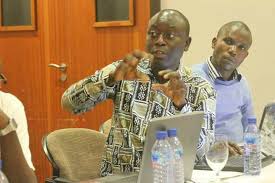New information minister affirms commitment to media reforms

By Mammy Saidykhan
Ebrima Sillah, the newly appointed Minister for Information and Communication Infrastructure (MoICI) has in his first public engagement expressed his commitment to ongoing media sector reforms in the country.
Sillah took oath of office last Monday, replacing Demba Jawo who was relieved by President Adama Barrow last month.
He pledged to open up the space for a free, pluralistic and responsible media as a means to ensuring a ‘fully informed Gambian society’.
He said: “I remain committed to these actions and timelines as set aside by the ministry with wider efforts that the government of The Gambia has been engaged in since February 2017.
“This is to ensure media reform and to put in concrete steps to create an enabling legal environment and policy framework to promote respect for freedom of expression and media.”
The Gambia’s new government, upon resumption of office in February, promised to reform all media laws. Nearly two years, however, the Gambia remains littered with anti-speech laws while access to information continues to be problematic.
Sillah, who until his ministerial appointment, was the Director General of the state-owned broadcaster – GRTS, made the promise to speed up the process today as he presided over the official opening ceremony of a two-month investigative journalism course organised by Gambia Press Union.
Being facilitated jointly by The University of The Gambia School of Journalism and Digital Media and the GPU School of Journalism, the training is funded by the Open Society Initiative for West Africa (OSIWA).
Minister Sillah said of the training: “I welcome this initiative to train investigative journalists, because investigative journalism is the unusual form of our profession, it is important therefore that those that are interested in it have their capacities built.
“I am convinced the selection process considered journalists who already demonstrate well developed reporting skills, board general knowledge, good research skills and a strong sense of fairness.
Meanwhile, the GPU Secretary General, Saikou Jammeh, said the training followed an assessment of the media sector done together with Information Ministry, with support from Media Foundation for West Africa, International Media Support and Gambia Media Support.
“Today’s training is the first capacity building activity by GPU base on the Comprehensive Media Sector Reforms Framework, which among others, identifies the need for a rigorous skills acquisition in investigative journalism,” he said.
He added: “There remains a backlog of not-so-well-trained journalists, besides the fact that we are still dealing with the residue of the repressions of the past as the media recovery from the ruins of its economy and institutions is very slow.
“This is to the extent that we’re all witnessing similar trend of reporting. There’s very little of critical news analysis, informed commentary, in-depth and insightful news reporting, talkless of investigative journalism.”
Jammeh urged Gambian journalists to be investigative in order to safeguard and strengthen the country’s young democracy.
“Essentially,” he said, “it doesn’t matter what type of journalism you do; to me, you’re not a journalist when you’re not an investigative journalist because journalism by nature should be investigative.
“I am therefore happy that we have come this far in realizing our objective of creating for the first time a group of investigative journalists who we hope will be the touch bearers for this branch of journalism.”


Comments are closed.